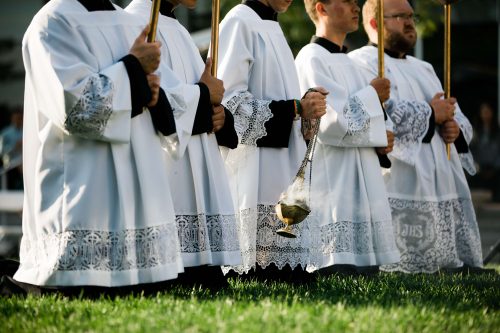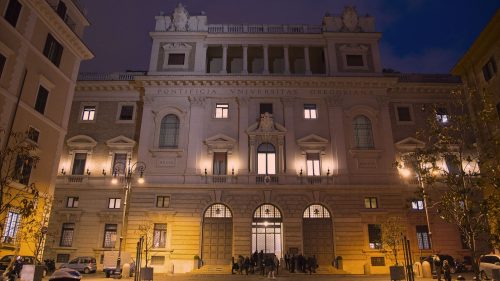Spontaneous prayers are short, effective, “easy to remember” vehicles for grace in daily life. If we are to avail ourselves of the grace which God wants to give us, we should have a variety of these at hand for use in times of trial, forgiveness, temptation, etc.
I will speak of four groups of spontaneous prayers:
- Prayers in times of trial, suffering, and anxiety
- Prayers to ask for forgiveness
- Prayers to offer forgiveness
- The “all-purpose” prayer, “Thy loving will be done.”
Prayers in Times of Trial, Suffering, and Anxiety
The first and most important prayer here is “Help.”
We oftentimes forget it because we think it is too easy or that God would not respond to something that simple; but if God really is Unconditional Love, and God not only hears us but wants to help us in our time of need, then the prayer “Help” should be more than sufficient to engender the heart of God toward a myriad of unexpected graces.
This prayer can be further (and beneficially) specified by a variety of other prayers.
I will here mention only four that have been very important in my own life.

Prayer for Tring times: The Hail Mary
For some reason, this prayer has not only been a foundational contemplative prayer but also one of galvanizing grace in times of trouble.
Our Blessed Mother’s consoling presence seems to be evoked (along with her help) during the most desperate of times.
This prayer, when repeated, opens upon a consolation filled at once with familial strength, a mother’s understanding, and assistance for a “child not fully in control.”
It seems to activate a providence (a conspiracy of grace) that betokens a mother’s request of her son, much like the Wedding Feast at Cana (John 2:1).
Countless have been times when it has come naturally to my mind, inviting me to repeat it.
Countless, too, have been times when that repetition has led to increasing peace of mind and clarity of thought.

I do not know why, but it always seems to give me courage—the courage to do what is right, to face adversaries, to move ahead with unpopular plans, and to bear the possibility of defeat bravely.
Jesus intended that His family be our family and that His Mother be our Mother (John 19: 27), and so we can believe that she would do for us everything she would do for Her Son—particularly comforting us, interceding for us, and being protectively present tous.
Speaking from experience, in my times of need, I have never been disappointed by Her.
Lord, Make Good Come Out of This Suffering
Sometimes trials turn into suffering, and sometimes suffering has neither speedy relief nor obvious meaning.
At these times, it is essential to ask for the Lord’s help to optimize the good in suffering (good for oneself, good for others, good for the community, and even good for the mystical body of Christ).
![]()
Suffering can be debilitating and depressing if we do not see any good coming from it.
However, if we recognize good in suffering for ourselves, others, the culture, the community, and even the mystical body of Christ, suffering can become not only meaningful but an invaluable companion in the life of grace, virtue, and salvation.
The above prayer has helped me to invoke the Lord’s blessings upon my suffering (and to recognize that blessing) in the deepest ways.
When I first became aware of the onset of a serious eye problem six months before my ordination to the priesthood, I was completely baffled.
Fortunately, I knew that God’s providential love would be operative through this challenge throughout the rest of my life. In that faith, I began to pray,
“Lord, do not waste one scintilla of this suffering. Make some good come out of it for me (a change in life direction, a deepening of faith and love, a protection from other adversity), for others (a zeal for Your kingdom, a desire to help others, an empathy with those in need, and an eagerness to serve the kingdom), for the culture, and for the community. Lord,please optimize the good that can come from this suffering.”
The Lord has certainly answered this prayer, for He has deepened my sense of gratitude for what I do have; He has helped me to see that every day and every moment counts in manifesting His love and presence; He has made me far more circumspect about what matters and doesn’t matter; and He has deepened my appreciation for the Beatitudes and the love intrinsic to them.
I frankly cannot imagine what my priesthood or apostolic zeal would be like without my challenge.
But I do know this; it would be less, much less.
Offer It Up
One of the great mysteries of Christian life is that our suffering can, with Christ’s, help in the redemption of others.
This is best explained in Jesus’ final words on the cross, reciting Psalm 22: “My God, my God, why have You forsaken me?” Jesus, here, was not referring only to the first line of that Psalm but rather to the Psalm in its entirety.

When one reads the Psalm, one notices a man who is going through a set of trials uncannily similar to Jesus’own sufferings on the cross, but more importantly, one notices that the psalmist is not discouraged by the trials being suffered.
He has a deep trust and confidence that God will use his sufferings not only for the good of the community around him but also to bring all the nations to Himself in the future.
Thus, when Jesus recited the words, “My God, my God, why have you forsaken me,”
He moved beyond the note of lamentation (in the first line) to a sublime confidence that the Father would effect universal salvation through His suffering.
Jesus’ passion is His free gift of self, that is, His unconditional Love.
When Jesus was dying on the cross, He created a “gift of self,” that is, an unconditional Love (as the scapegoat, as the paschal lamb, and as the blood of the covenant), which He intended to give to the Father to shower down upon humanity so that all the nations might come into His kingdom of unconditional Love.

We can imitate Christ in our own limited ways by presenting our sufferings to the Father as a “gift of self” (love) for the Father to shower down upon humanity as a grace to strengthen and unify the mystical body of Christ. Every moment of suffering is a potential for a gift of love (grace) to be showered upon humanity in its need.
All we need to do to convert suffering into grace for the world is to offer it up to the Father as our gift of self.
When I was a child, I would complain to my mother about various things that had gone wrong at school, and she would say, very matter-of-factly, “Offer it up.”
My general reaction was, “I’m always offering it up, and no good seems to come from it.”
It only occurred to me years later that the offering was not intended to be a direct benefit to me but rather a benefit for the world and the kingdom—which would eventually become my life’s purpose and passion.
By offering up my sufferings to God, I turn it into self-sacrifice—into a gift of self—which Jesus taught is “love for the life of the world.”

When I offer my suffering as a self-offering (act of love) to the Father and ask Him to make it a source of grace for those who need it, I know that He will do this—just as He did it for His Son.
In this way, the negativity of suffering turns into the positivity of self-offering, love, and grace.
My mother used to say, “Mothers know everything.”
In this particular case, that would be true.
I Give Up, Lord. You Take Care of It.
Sometimes life gets out of control.
No matter how hard we try to obviate free fall or to figure ourselves out, life’s circumstances seem to get the better of us.
It is at these moments that I recommend the above prayer, which I have put to great use throughout my life.
I recall my discovery of this prayer in Rome back in 1980.
I had been sent to the Gregorian University to take all of my theology classes in Italian.

I went to Italy two months early without any background in Italian to attain “fluency.”
I was reasonably confident after studying the language in Perugia for two months that I would be able to understand my classes.
My first class on the first day was an exegesis class on the Gospel of Matthew taught by a Spanish professor who spoke Italian faster than the Italians (with a Spanish accent).
I was not able to understand twenty-five percent of what he was saying and began to panic.
I kept thinking to myself (in my unqualified ignorance) that I was going to “go down.”
What would I say to my Provincial? To my classmates? “Here I am, back in the United States. I couldn’t understand anything, and I flunked out.”
Needless to say, I began to feel considerable discomfort.

Realizing that circumstances were quite out of my control, I muttered, “I give up, Lord. You take care of it!”
When I said this, it seemed like steam came out of my ears.
The pressure was relieved by simply giving it over to the Lord, who could providentially bring some good out of my predicament.
As a matter of fact, He did. The moment this prayer enabled me to calm down, I became content with understanding partial sentences and concepts.
I could then begin to make sense of the general line of thought, which, in turn, built my confidence and, in turn, enabled me to understand more.
As the semester progressed, I began to understand far more of what the professor was saying, and eventually made it to the final exam, where the professor gave two or three choices of questions for various passages of Scripture.

I was able to choose questions that pertained to the last parts of the course, thereby hiding my inadequate understanding of the first part.
In the end, I did quite well. (Thank You, Lord!)
Evidently, much of that success is attributable to my natural gradual appropriation of the Italian language and exegetical method, but much of it, in my opinion, was due to the composure and openness to the content induced by my trust in the Lord of love.
That trust was galvanized through the above simple prayer, “I give up, Lord. You take care of it.”
Lord, Push Back the Foreboding and Darkness
Foreboding is a complex phenomenon.

Some of it can come from feelings of anxiety and depression which our conscious or unconscious psyche projects into the future—so it is internally, psychologically induced.
To those, who, like myself, are not materialists, there is another side to foreboding—a genuine premonition about darkness or evil in the future.
I am uncertain about the cause of such premonitions—whether they are a warning from God, harassment from an evil spirit, or a kind of psychic protection—intrusion—into an impending future.
They could be the result of two or three of these causes.
Whatever the cause, I believe that foreboding is not completely psychological—and that it does portend some kind of future darkness.

I believe this for the simple reason that most of the time I experience it, something dark does, in fact, happen a few days later.
It contains not only a sense of darkness but powerlessness toward the darkness and resembles the descriptions of it by prophets (like Jeremiah, Ezekiel, and Isaiah)—mythologists (like Thomas Malory and J.R.R. Tolkien), and litterateurs (like Sophocles and Shakespeare).
When these premonitions are accompanied by feelings of powerlessness and anxiety—I refuse to entertain them.
I give them over to the Lord immediately by saying the simple prayer, “Lord, push back this darkness and foreboding.”
I even use my hands to gesture, pushing back against something tangible and palpable—while I repeat the prayer, “Lord, push it back.”
Since I’m fairly sure that something dark or harmful is about to happen to me, I also use this follow-up prayer—“Lord, take care of the dark situation which is about to befall me—please protect me, and minimize the harm that may come to me.”
I frequently repeat that prayer until the foreboding begins to subside.

Most of the time, the foreboding does subside.
It does so in stages—first, it loses its bite and intensity, then it gradually weakens, and finally, after some time, a sense of normalcy or even consolation occurs.
I can think of only a few occasions when the sense of normalcy—consolation did not occur—though the sense of foreboding decreased considerably.
Prayers for Forgiveness
God’s unconditional love makes the prayer of the tax collector in the temple quite efficacious.
In Jesus’ Parable, a tax collector—considered to be one of the very worst of all sinners—stood at the back of the Temple and sincerely prayed, “Have mercy on me, Lord, for I am a sinner” (Luke 18:13).

As Jesus said, “That man went home justified” (Luke 18:14), which means he was ready for salvation.
Bearing Jesus’ promise in mind, we can always use this prayer to sincerely petition the Lord for mercy and forgiveness—with the assurance that he will hear and respond to us in the same way as the tax collector.
Yet, there is even more to forgiveness in Christian life than the beauty of justification through God’s unconditional Love.
Two prayers may help to bring out these richer dimensions.
Lord, I Accept Your Forgiveness
It is interesting how we can sometimes run from the incredibly liberating prayer of the tax collector because we think that God will hold back His forgiveness until we are a little more deserving, a little less weak, or a little more perfect.
When I was in the novitiate (the first stages of Jesuit formation), I slipped into the habit of believing that God had not quite forgiven me for my sins.
Though I had heard the Parable of the Prodigal Son and knew Jesus’ address for the Father as “Abba,” I was aware of His admonition to forgive seventy times seven times and tacitly aware of the implications of the Eucharist and the passion (with respect to God’s unconditional love), I would come away from my prayer of repentance with the sneaking hunch that God was saying, “I wish I could forgive you, but unfortunately your repentance was not quite right, and there’s still too far to go before you’re perfect enough to be forgiven.”

Since I did not want to be caught short, I would pray an alternative prayer, “Don’t worry, God. I’ll get it taken care of, and when everything is fine, then I’ll be able to ask You for forgiveness, and then You will really want to forgive me.”
I had forgotten an important aspect of the spiritual life, namely, I need God—especially to turn my life around (metanoia).
By putting so many limitations on God’s love, mercy, and forgiveness, I had slipped into the worst of all possible spiritual attitudes (which is devilish, to say the least), for I had conditioned God’s forgiveness on being “good enough,” yet I could not be “good enough” without God’s forgiveness and healing.
The father of the Prodigal Son was standing outside my spiritual dome, waving at me and trying to get my attention while I was busy, turning him into a stoic ogre who would not want to give me his attention because I was not good enough.

Fortunately, my novice master recognized the insanity of my position and pointed to the conundrum, asking, “What does God have to gain by having you keep Him on the outside of your life? Why in the world would God not want to get into your consciousness and help you clean up what you even perceive to be a mess?”
It occurred to me that even if God were a pure pragmatist (which He is not), He would have nothing to gain by putting me into a position of zero progress and very probable regression.
Since I was miserable, I readily assented to His point.
He gave me the following advice which I have maintained throughout my life: “When you ask for forgiveness, turn to God with the heart of a child who trusts unconditionally in his parents and say, “I accept Your forgiveness.”
What a relief! Since God’s love is unconditional, I can accept His forgiveness with the full knowledge that it is His intention to set me free.

I have devised a three-step process for asking for forgiveness which accounts for this unconditional trust in God’s unconditional Love:
- First, affirm that God really is Abba, that God really possesses the unconditional Love of the Prodigal Son’s father, that the divine Son really became incarnate and died in order to unconditionally give Himself away (in an act of unconditional Love), and that the Holy Spirit is really working to effect that unconditional Love within the world.
- Secondly, affirm that God does want to forgive and heal you in order to work with you toward metanoia and that God could have no other attitude because it would lead to the demise of the whole human race.
- Thirdly, given this, when you ask for forgiveness when you say, “Have mercy on me, Lord, for I am a sinful person,” accept His forgiveness—accept it as the prodigal son returning to his father’s house, accept it with the heart of a child who truly believes that his parents want to forgive him even after he has “committed every imaginable offense.”
Put on the mind and heart of Saint Peter at the Sea of Tiberius after Jesus’ crucifixion when he hears John say, “It is the Lord.”

After denying Jesus three times, he dives into the water and swims to shore, convinced that Jesus has but one thing in store for him—His healing and forgiving love (John 21: 7-9)
I took my novice master’s advice, and I put on the heart of a child, and when I address “Abba,” I say, “Have mercy on me, Lord, for I am a sinful man. And I accept Your forgiveness and invite You into the depths of my soul so that You may call me to transformation.”
Make Good Come Out of Whatever Harm I Might Have Caused
The Lord’s forgiving and healing love extends to the people we might have harmed by our attitudes or actions.
If the harm is intentional, we need to ask those who are harmed for forgiveness, for in this one act of humility, we can redress the cycle of resentment begetting vengeance, vengeance begetting violence, and violence giving rise to further violence.
We empower others to forgive us, and even if they should refuse, we are still the recipients of God’s healing and forgiving love.
In the midst of trying to clear up harm or even possible harm, we often find ourselves powerless.

Sometimes we do not recognize the depth of the hurt we might have caused; sometimes, we are not even sure if we caused harm; sometimes, we only realize that we might have caused harm hours after perpetrating possible harm; sometimes, we feel powerless when others cannot forgive us or talk to us.
In all such cases, there is a brief prayer that can prevent us from collapsing under the weight of our burden, a prayer that allows the grace of God (through the Holy Spirit) to work in the hearts of others, to effect eventual reconciliation and peace: “Lord, please make good come out of whatever harm I might have caused.”
Many have been times when I have found myself in such predicaments.
Sometimes I am giving advice that I think will be quite fruitful, only to realize at 3:00 in the morning (when I wake up with startled lucidity) that I might have really “blown it.”
“Oh, no. That person might have taken the comment this way or that other way and may now be plunged into depression because of my idiocy. . . Arghh!”
I think to myself, “They probably won’t want a call at 3:00 in the morning to hear my attempt to straighten out the matter.”

At times like these, the above prayer is quite helpful.
When I pray it (in confidence and trust), I sense the Holy Spirit working in the hearts of people I may have offended or harmed, and I sense a peace arising out of that confidence.
I frequently find that my confidence is confirmed when the “victim” comes up to me a few days later and says, “Fr. Spitzer when you said X, I really took it in the wrong way. I thought you meant Y, which really disturbed me, but the next day I got up, and I got a different insight into what you were saying, and now I realize that you meant Z, which has been really helpful.”
As I listen to this great miracle of the Holy Spirit, I think to myself, “Whew!”
I feel like Mario Andretti, on a speedway, after avoiding a potentially deadly crash by a split second.
I have no question about who was driving.

Prayers Offering Forgiveness: Lord, You Are the Just Judge—You Take Care of It
Jesus enjoins us to forgive one another from the heart, to forgive seventy times seven times (Matthew 18: 21-22), and to ask the Father to “forgive us our trespasses as we forgive those who trespass against us” (Matthew 6:12).
It will probably come as no surprise that Jesus mentions this one prescription more often than any other commandment, injunction, or prescription in the New Testament. Why?
Because violence begets violence, vengeance begets vengeance, resentment begets resentment, and the cycle will continue and grow so long as one of the offended parties does not let go.
If one party does let go (forgives), the cycle frequently devolves, and forgiving eventually turns into forgetting.
As you know, forgiving (the intention to let go of an offense intentionally and unjustly perpetrated against us) takes far less time than forgetting.

My general rule is for minor offenses forgetting occurs at least six weeks after forgiving, and, in the case of particularly egregious offenses, forgetting can take several years longer than forgiving.
In any case, one thing is clear—without forgiving, forgetting is impossible. Indeed, the opposite occurs.
The memory of an offense seems to mushroom in its proportions and emotional discharge.
When I am in a “non-forgiving mood,” I tend to exaggerate all the bad features of memory, omit all the good features of the perpetrator, and attempt to construct a scenario whereby the demon-other has perpetrated the unforgivable—then I get good and mad.
Without forgiveness, the reliving of a scenario seems to get worse with every self-retelling.
The above prayer has helped me immensely in this regard: “Lord, You are the just Judge. You take care of it.”
I remember the time I discovered this prayer.
I had written a philosophical paper, and a colleague criticized it behind my back.

When I had publicly read the paper, I had given ample opportunity for questions and had even submitted the paper to selected individuals before reading it.
This particular colleague said nothing.
But a few days later, he was not only critical of the paper but also of me.
When someone called this to my attention, I was quite angry.
Even after I had redressed the criticism in writing, I felt no relief. In fact, my anger began to grow.
Every time I opened my breviary, this person’s face suddenly appeared.
Instead of taking the hint from God, I chose to stew in my anger.
Finally, it occurred to me that this was only hurting me, and furthermore, it might cause me to say something I would regret, so I had to face it.
I first tried to face it on my own, “Okay. . . now I’m going to stop thinking about this, and I’m going to forgive this person from the heart,” but every time I tried the “solo method” I found myself having about one-half second of peace followed by an intense burst of anger.

I was quite helpless.
Finally, it occurred to me: why not let God help?
So I said, “Okay, Lord, You’re the just Judge. You can see into the hearts of every human being. You understand our history and our failings. You can effect reconciliation where mere mortals cannot. Okay, You take care of him; in fact, You take care of the whole situation, please.”
An unbelievable peace began to come over me.
By putting this person (and the past situation) into God’s hands, I allowed the Holy Spirit to work His reconciling love through His infinite providence in my heart.
In letting go (into God’s hands), I was eventually able to forget; and in the forgetting, I was able not only to find peace but also to even smile at and acknowledge the person who had offended me.

This is a powerful prayer, and I have used it often.
The immense reconciling love of the Holy Spirit cannot be underestimated in its power to transform and bring peace. This leads to the next prayer.
Prayer for Enemies
Jesus admonishes us to “love your enemies, do good to those who hate you, bless those who curse you, pray for those who mistreat you” (Lk 6:27-28).
Paul does the same by saying, “If your enemy is hungry, feed him; if he is thirsty, give him something to drink” (Romans 12:20). In both my life and leadership positions. I have found no greater advice.

What at first appeared to be virtually impossible (and purely ironical), I have found to be not only possible but utterly efficacious and transformative.
Throughout my career, I have found myself in conflict with people (sometimes justifiably, sometimes not).
I have seen how these conflicts can intensify in emotion when people continue to think the worst about one another.
These emotions can become so heightened that there seems to be no way of reconciling (or even communicating) with the parties in conflict.

When this occurs, I begin my campaign to pray for those who feel extremely angered by me or are trying to harm me.
I ask at least three or four times a day that the Lord enter into their hearts, show them His love, and bring them to Himself.
The response is absolutely remarkable. A great majority of the time, the person for whom I am praying will show a marked decrease in hostility within days.
Sometimes they display an openness to compromise and even manifest understanding and compassion for both me and my position.
This connection between prayer and“completely unexpected results” is so highly correlative I recommend that people practice it not only to effect reconciliation but also to see firsthand the power of prayer!
Again, the power of the Holy Spirit to work through the hearts of intrinsically dignified human beings and to draw them toward the love for which they were created cannot be underestimated.

The All-Purpose Prayer: Thy Loving Will Be Done
Without a doubt, the most important prayer of all is “Thy loving will be done.”
Jesus teaches us this prayer in the Our Father (Matthew 6:10 and par.) and uses it Himself in the agony in the garden (Matthew 26:42 and par.). Since that time, it has become a centerpiece of Catholic/Christian spiritual life.
It can be used in times of fear, temptation, anger, and trial; indeed, it may be substituted for all of the prayers given above.
If you cannot remember any other prayer, default to this one.
Why? Because the will of God is optimally loving, optimally good, optimally just, and optimally salvific, and when the will of God is working through you, you become an instrument of God’s optimally loving, good, just, and salvific will in the world; you become the agent of a legacy that will last into eternity, an agent for the kingdom of God manifest on earth and perpetuated for eternity.
There could be no more worthy purpose for living than this.
That is why this prayer can make good come out of our harms, can make good come out of our trials, can calm us in the heat of anger, can help us in times of temptation, and can bring salvation out of every seemingly negative course of events. If we give our problems over to God by praying, “Thy loving will be done,” He will bring good for us, others, the community, the culture, and His kingdom out of the most bizarre, tragic, desolate, angering, hurtful, fearful, tempting, and confusing dimensions of our lives.

In that efficacious will, there is peace—a peace beyond all understanding (Philippians 4:7).
I say this prayer at least 25 times a day, and I find the all-loving will of God and the immense providence of the Holy Spirit to be unbelievably efficacious and transformative.
There is only one thing to remember: we cannot have the wrong attitude about God or His will.
If we forget that God is Abba, the father of the prodigal son, the Father of Jesus the Beloved One, and Unconditional Love itself, then we will start attributing antithetical qualities to Him, such as stoic indifference, competition with us, getting even with us for past offenses, anger and retribution, lack of forgiveness and mercy, unkindness, and boastfulness.
These false characterizations of God—which run contrary to the Hymn to Love in I Corinthians 13—serve only to undermine our relationship with the unconditionally loving God, not because He withdraws but because we no longer trust Him enough to let him near.

There is another consequence of the above false characterizations of God: we not only view Him as uncaring and untrustworthy but also His will.
Instead of seeing His will as focused on optimizing love, goodness, and salvation, we imagine it as a sword of Damocles ready to drop on our heads in some capricious fashion.
When we believe that God’s will is harmful or capricious, we cannot bring ourselves to ask for it; instead, we run for cover.
We have all heard the jokes about the capricious God who tries to convince some “poor sap” to let go of a tree limb on a cliff only to let him fall to his death.
If we let these jokes (and the attitude of “Murphy’s Law” underlying them) become pervasive in our minds and hearts, we will likely deprive ourselves of the most powerful, spontaneous prayer the Lord has given us.
I had an experience of this in my first month at the Jesuit novitiate. We were given the prayer of Saint Ignatius to say at our final prayers:
“Take, Lord, receive all my liberty, my memory, my understanding, and my entire will. Whatsoever I have or hold, You have given tome. I give it all back to You. Dispose of it wholly according to Your will. Give me only Your love and Your grace, and that’s enough for me, and I ask for nothing more.”
As can be seen, this is an enlarged and eloquent way of saying, “Thy loving will be done.”
Unfortunately, when I first came to the novitiate, I had not appropriated (in either my mind or heart) the unconditional love, goodness, justice, and salvation intrinsic to the will of God.
As a result, I prayed this prayer in what now appears to me to be an incredibly humorous (but at the time, fearful and painstaking) way.
I began by saying, “T-t-take, L-Lord, receive all my liberty (but I really like my liberty, so don’t destroy it if I give it to You; on second thought, I’ll take it back for safekeeping); m-m-my memory (but You gave me a good memory, and I really need it, and I really use it, so please don’t destroy it if I give it to You; on second thought, I’ll take it back for safekeeping); m-m-my u-understanding (but You gave me a fine intellect and I really use it, so please don’t destroy it if I give it to You—I think I’ll take it back for safekeeping. . . . Whew! I made it through that prayer, and I’m still intact.”
This clearly was not the intention of Saint Ignatius, who probably would have been mystified by the sheer panic I was experiencing in giving myself over to God’s will.

This prayer takes on a completely opposite significance when one remembers that God’s will is to bring optimal love, goodness, justice, and salvation out of every fiber of our being and every aspect of our actions.
When we remember this, the prayer, “Thy loving will be done,” becomes an instant conduit for God’s love and grace to work in us and through us.
Some readers may be thinking, “If God’s will is truly optimally loving, good, and salvific, then why do we have to ask for it? Why doesn’t He just simply do the good that He truly wants to do?”
The answer lies in a simple word: “freedom.”
God will always respect our freedom and, therefore, our choice to have Him work in us and through us.
If we do not ask for His loving will to be done, He cannot go through with it without violating our freedom.

When we remember God’s loving and salvific will, this little prayer can provide us with His peace, strength, insight, and love, making all the gifts of the Holy Spirit come alive in us.
At this juncture, our thoughts, actions, and operations become an instrument for His optimally loving, good, just, and salvific purposes.
I use this prayer in times of fear, loss, deprivation, temptation, anger, and guilt, which reveals that it can be substituted for all the other spontaneous prayers mentioned above.
Of course, those other prayers have a special kind of efficacy for us because they focus on specific needs in specific situations.
Nevertheless, if we cannot remember those other prayers in a moment of fear or suffering, we will probably be able to remember the prayer of Jesus Himself: “Thy loving will be done.”

Beyond Spontaneous Prayers
I recommend that readers use these prayers to get started on the life and adventure of transcendent grace, purpose, and happiness.
They will be both an indispensable support and a passageway to even deeper faith and prayer.
When you feel called to a deeper relationship with the Lord, I would recommend using two resources:
- Five Pillars of the Spiritual Life: A Practical Guide to Prayer for Active People
- Finding True Happiness: Satisfying our Restless Hearts
These two resources will help you to develop three other kinds of prayer:
- Contemplative prayer
- Transformational prayer (called the “Examen Prayer”), and
- A primer on how to follow the inspiration and guidance of the Holy Spirit (including a summary of “St. Ignatius’ Rules for the Discernment of Spirits”).
Catholics will want to become more deeply aware of the significance of the Holy Eucharist according to Jesus. This can be found in Five Pillars of the Spiritual Life as well as another resource: God So Loved the World: Clues to our Transcendent Destiny from the Revelation of Jesus.
The power, peace, and communion of this gift of the Lord at the Last Supper cannot be underestimated.

